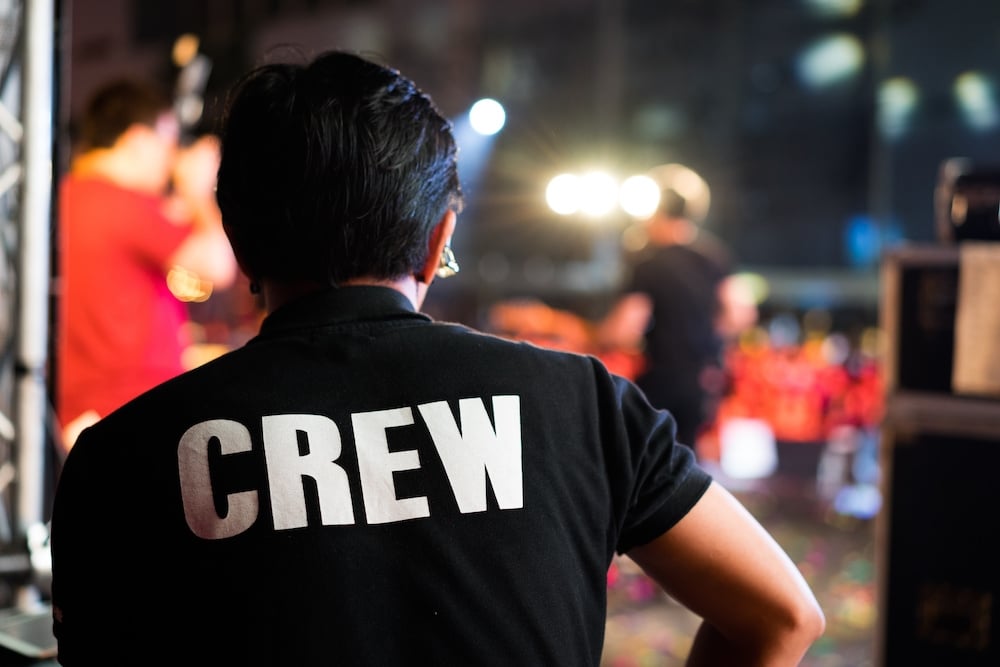As an event planner, you know that a lot of work goes into putting on a great show. And as an event production company, we put a lot of work into assembling a great AV crew to help you out! If you’ve worked with an event production company before, you’ve undoubtedly seen a lot of people in a lot of different roles, so we’re here to break down what each of them is responsible for. Remember, not every event will require all of these team members—and some may require additional production crew—but here are seven you can typically count on seeing.
Event Production Roles and Responsibilities: Meet the AV Crew
Project Manager/Technical Director
Your go-to guy or gal at any event, the Project Manager (or PM) is who you’ll work most closely with before, during, and after the affair. Think of the PM as your new BFF; you’ll undoubtedly have them on your speed dial! In addition to keeping you abreast of all that is going on, the PM acts as a liaison between you and all other AV crew members, simplifying your life so that you have one easily-reachable point of contact with whom to work out all event details. You may sometimes find that the Project Manager is called the Technical Director; this is usually when in addition to PM duties, they also handle design and consulting on the technical aspects of the event, as well as equipment selection.
Show Caller
Sometimes referred to as a Technical Director, the show caller is the “conductor” of the event. They “call” the show, meaning they communicate with the entire production crew through an intercom from the beginning to the end of the production. Often, you’ll find the show caller located in the middle of the production area, fixated on a variety of monitors so they can better manage the flow of the show.
Video Engineer
Today, most events are recorded, broadcast, live streamed, or captured in shareable social media snippets. Either way, the production needs to look and sound great to keep the attention of those not in attendance. The video engineer is responsible for making sure everything is captured in a high-quality format. Another video production team role is Video Switcher. As the title implies, this individual is in charge of making sure the right video signals get routed, or “switched,” to the correct projectors, confidence monitors, and notes monitors. They are also skilled at switching between cameras, computers, and other video sources at just the right moment.
Graphics/Playback Operator
We often think of a Graphics Operator as the person putting news captions or football scores on a live broadcast, but for a live event, they are in charge of creating the graphics that appear on walls, backdrops, and other areas of the venue. They are also in charge of advancing slides and playing back video content at the correct cue times. As with video switching, for events with smaller budgets and fewer cues, these duties may sometimes be merged into the primary Video Engineer’s responsibilities.
Audio Engineer
The Audio Engineer is, of course, in charge of sound, making sure that mics don’t cut in and out, that volume levels remain consistent (or raise and lower when appropriate), and that feedback and static are non-existent. They’re also in charge of making sure the audio experience is equally great whether listeners are seated in the front row or the nosebleed section. Typically, there is also an assistant engineer, or A2, to place mics on talent, check batteries, etc.
Lighting Designer/Operator
The days of just flipping on some overhead lights are long gone! Today, with so many lighting options available—spotlights, moving lights, gobos, lekos, uplights, and more—event production companies require someone with specific expertise in lighting. But it’s not enough to just know how to operate the equipment; a good Lighting Operator also knows how to create a mood or an ambiance that fits the theme or type of event.
Stage Manager
Depending on the type of event, the Stage Manager may have a variety of duties, all centered around—you guessed it—the stage. As a member of the production crew, their responsibilities may include:
- Stage buildout and carpentry coordination
- Pipe and drape setup
- Podiums
- Curtains or backdrops
- Green room setup
- Communicating with the Show Caller and setting up calling cues
- Preparing teleprompters;
- Timing speeches
- Escorting performers/speakers to and from the stage
Hopefully, this production team list has provided you with some insight into what various AV crew members of your event production crew are responsible for. Of course, depending on the type and size of the event, many more roles may need to be filled, including additional engineers and operators, lighting technicians, creative directors, assistants, riggers, gaffers, editors, and many other positions. The best event production company will have experienced professionals to fulfill all roles as necessary. If you’re planning an event and want a production crew that’s hard working yet easy to work with, contact One Way Event Productions today.

